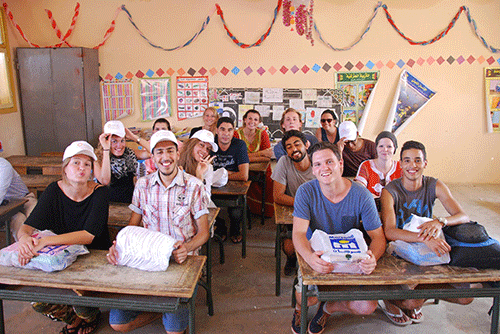
International Studies helped Nassim Abba broaden his horizon: ‘Everyone brings their own outlook with them’
Nassim was in the first cohort of students who began the bachelor’s programme in International Studies in 2012. His foreign classmates changed his outlook on the world. He now advises managers and civil servants on issues in higher education and internationalisation. His international perspective helps him in that.
Name: Nassim Abba (25)
Job: Policy adviser at VSNU (the Association of Universities in the Netherlands), working with projects and dossiers in the domains of International Affairs and Education. Was previously social counselor for Vluchtelingenwerk (a Dutch NGO serving refugees), and completed an internship with the Middle East and North Africa Board of the Ministry of Foreign Affairs.
Degree programme: bachelor’s degree in International Studies (2015), master’s in Public Policy & Human Development (2017, Maastricht University)
Where does this interest in diversity and society come from?
‘I like doing work where social interests are a key factor and that you’re serving those interests. During my master’s programme in Maastricht, in addition to theory, I wanted to share my knowledge with people who needed it. I came in contact with Vluchtelingenwerk, who directed me to a volunteer position that guided refugees to a job or educational programme. During my bachelor’s programme I focused on the Middle East and North Africa, as a lot of refugees were coming from Syria at the time. That combined my two interests. Even as a child I had been fascinated by the region; it was dynamic and there are a lot of political developments. My own ethnic background is Moroccan, and at home, the television was often tuned to Al Jazeera and other Arabic news channels. When I started university, the Arab Spring was also in full swing. When I had to choose a region for International Studies, the choice was easy.’

What skills are you putting to use now that you learned at university?
‘More than half of the students in International Studies came from outside the Netherlands. That taught me a lot. It takes you out of your own secondary school bubble. In the tutorial discussions I learned a lot from their perspectives and that you can only understand your own identity when you realise that other identities exist. I try to factor in my own cultural background and experience and to apply it in my job. I speak Arabic and understand the culture. That’s something I can use. Other things that are now important in my work are critical thinking, applying different contexts, and dealing with political sensitivities. The VSNU is both an employers’ group and a lobbying organisation, so how do you approach social discussions, how do you communicate within hierarchical structures? How do you ensure that your recommendations are well communicated and that the process runs in such a way that you get the right results?’
How did you end up with your current employer and what exactly do you do?
‘I came into contact with higher education through a project in which, together with others, I put together a university preparation programme for first-generation students. I really liked that, so after I graduated I sought out that kind of policy position. The domain I work in changes each year: last year I did human resources policy, communication, and public affairs. Recently I’ve been involved in the internationalisation of education and how you steer that in the right direction. There is a social discussion about the effects of internationalisation on universities. But whether you have Moroccan roots or are a Dutch person from Friesland, everyone brings their own outlook with them. “There’s no such thing as the average Dutch person,” as Queen Maxima once said. There are Dutch people from different backgrounds. That also includes your socio-economic background and whether you come from an urban area or a village. I learned that in International Studies: a tutorial with various people provides a better, more enjoyable discussion because you get to hear things that you would never have thought about.’

A minor in Morocco
Nassim: ‘As part of my BA in International Studies, I did a minor at NIMAR in Rabat. That was a great experience because I could take courses and do research at the same time in a country in the region I was specialising in’. Want to know more about the NIMAR, or other minors? Visit the Minor market op 16 April!
